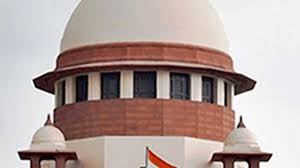Contempt of Courts Act, 1971, Section 2(c), 12 and 19 – Contempt of Court – Punishment – Appeal – Held that in complete agreement with the decision of the High Court on the need to maintain the dignity and reputation of judicial officers and to protect them from motivated, libellous and unfounded allegations – Even here, the appellant is trying to resort to forum shopping by asking us to refer the matter to a judge who had issued notice in a connected matter – The appellant has failed to see that notice in the lead matter was issued more than a decade and half ago – While the appellant seeks to de-tag the court martial proceedings as if they are unconnected to the egregious act of contempt – Note that those proceedings were not of a client of the appellant, in fact, the appellant himself was subjected to court martial proceedings, and he was in fact appearing as a party-in-person -Do not see two different lives here – The appellant contemnor is the petitioner in the court-martial proceedings -The appellant had in fact appeared before the Court after issuance of notice under the Act. Making an assertion that there was no service of the notice is factually wrong – The appellant, while making an allegation of bias should have supplemented it with cogent material, which he has failed to do – This again, is an irresponsible statement – Appellant’s conduct before the High Court and for that matter, even before this Court, amounts to undermining the system of the law and interfering with the course of justice administration – High Court observed a pattern in the behaviour of the appellant – He has had a habit of misbehaving with a Bench which is not agreeing with him -The misbehaviour goes to the extent of casting aspersions and threatening the Judges hearing the matters – High Court correctly rejected the apology – An apology must evidence remorse with respect to the contemptuous acts and is not to be used as a weapon to purge the guilty of their offence – Finding of conviction against the appellant warrants no interference -However, considering the age of the appellant and taking note of his submission that he is suffering from certain medical ailments, the sentence imposed by the High Court modified from imprisonment for three months till the rising of the court. (Para 17 to 25)
SUPREME COURT OF INDIA
2024 STPL(Web) 69 SC
[2024 INSC 74]
Gulshan Bajwa Vs.Registrar, High Court Of Delhi & Anr.
Criminal Appeal No. 577 of 2007 With M.A. 256 of 2017 In Contempt Petition (C) No. 64 of 2007 With Special Leave Petition (Crl.) No. 9689 of 2018 With Diary No. 44408 of 2018-Decided on 30-1-2024
https://stpllaw.in/wp-content/uploads/2024/04/2024-STPLWeb-69-SC.pdf







